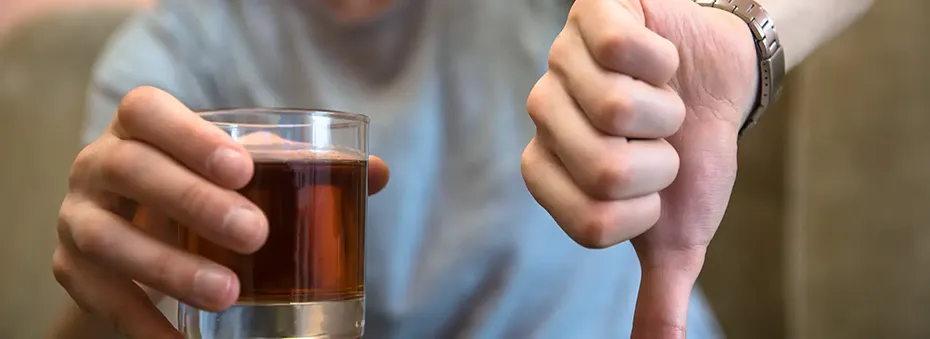
Table of Contents

Alcohol withdrawal can be dangerous and even life-threatening for some people. As such, the best way to detox from alcohol is through a safe, medical detox program that monitors your health and supports you if withdrawal symptoms become severe. Taking the right steps can make detoxification safer and help you start your recovery on the right path.
Understanding Alcohol Detoxification
Detox is a physical and emotional journey that impacts your entire body and mind. It happens in different stages, and understanding what happens during alcohol detox can help you feel more prepared and supported.
How the Body Processes Alcohol
When you drink, your liver is responsible for breaking down most of the alcohol. It uses enzymes to change alcohol into other substances and remove it from your blood. However, the body can only process a limited amount of alcohol per hour.
If you consume alcohol faster than your liver can handle, it starts to build up in your bloodstream. This can affect many parts of your body, including your brain, heart, and stomach. Over time, heavy drinking can make your liver less effective.
Once you stop drinking, your body begins detoxification by clearing the remaining alcohol from your system. This can trigger symptoms of alcohol withdrawal, which may feel mild at first but can escalate without warning.
Alcohol Withdrawal Symptoms
Alcohol withdrawal happens when your body gets used to having alcohol and then suddenly doesn’t get it. Withdrawal symptoms begin within just a few hours after you stop drinking.
Common symptoms include:
- Sweating
- Shaking (tremors)
- Anxiety
- Nausea and vomiting
- Headaches
- Confusion
- High blood pressure
- Hallucinations
- Severe cravings for alcohol
Severe symptoms, like seizures or delirium tremens, need medical help right away. Some withdrawal symptoms can be life-threatening, so detox for alcohol use is best done with medical supervision.
Risk Factors and Considerations
Your risk for problems during detox depends on several things, such as:
- How long and how much you used to drink
- History of alcohol addiction or alcohol use disorder
- Co-occurring substance use issues
- Underlying medical conditions (e.g., heart disease, liver problems)
- Previous detox attempts
- History of seizures during alcohol withdrawal
Additionally, trying to detox at home without medical support may seem convenient, but we never recommend this as it can be dangerous and result in more complications.
Connecting with a healthcare provider or a healthcare professional can guide you through the safest treatment options.

How to Safely Detox from Alcohol
Detoxing from alcohol can be risky without the right support. Many healthcare professionals strongly recommend starting with a medical detox program tailored to your unique needs and history with alcohol use.
Supervised Medical Detox Programs
A medically supervised detox program is staffed by doctors and nurses who understand alcohol withdrawal and alcohol dependence. These teams monitor your vital signs, offer support, and help manage symptoms like shaking, sweating, or confusion.
If you have a history of heavy drinking, medical supervision is especially important because some withdrawal symptoms can be life-threatening. In these programs, staff check for any health problems that could get worse during detox. They can administer fluids, vitamins, and other treatments to help stabilize you.
During a detox treatment program, you stay in a safe place, usually for several days, while your body clears the alcohol. Facilities may have different rules, but most don’t allow alcohol or drugs during your stay.
This structure helps prevent relapse. If you feel anxious or sick, you can get help quickly. Remember that medical supervision can make a life-saving difference, so it’s always the best option when handling withdrawal from alcohol.
Medications for Alcohol Detox
Treatment for alcohol withdrawal may also include the use of medications for safety and comfort. Benzodiazepines are one of the most common medications used during treatment. They are often given to lower your risk of seizures and reduce anxiety.
These medicines must be used carefully since they can also be addictive if misused. Other medications, like anticonvulsants, help with seizure prevention.
Vitamins like thiamine are commonly provided to prevent nerve damage and brain problems caused by alcohol withdrawal. Your doctor will select the most suitable medications based on your medical history and symptoms.
Bringing up your full medical background helps find the safest plan. If your withdrawal symptoms become severe, staff can adjust your medicine quickly to help you feel better.
Inpatient vs Outpatient Detox
When you’ve been drinking large amounts of alcohol, your body becomes dependent on it. In inpatient detox, you receive care from medical professionals who are trained to recognize and respond to these risks.
This is best if you have severe withdrawal, other health issues, or little support at home. The close supervision reduces risks and helps keep you safe. Unlike outpatient options or trying to detox from alcohol at home, inpatient alcohol detoxification gives you a safe, structured environment where every aspect of your health is considered.
Other Ways to Manage Alcohol Addiction
Safe alcohol detox often requires more than just quitting drinking. A well-rounded approach focuses on both your body and mind, utilizing safe methods to alleviate discomfort, foster good habits, and prevent relapse.
Nutritional Support and Hydration
When you’ve been drinking large amounts of alcohol, your body becomes depleted. Eating healthy foods is key to helping your organs heal during detox.
Focus on meals high in protein, complex carbohydrates, and fresh fruits and vegetables. Vitamins, especially B-complex and vitamin C, help repair your nervous system and support your liver.
Drinking plenty of water keeps you hydrated and flushes out toxins. Some people find electrolyte drinks or broths helpful if they’re feeling weak.
Try to avoid caffeine and sugary drinks during this time, as they can worsen anxiety or disrupt sleep. If your appetite is low, eating small meals throughout the day often works better than forcing yourself to eat large portions when your appetite is low.
Therapeutic Interventions
For many people, alcohol withdrawal symptoms are just the surface of what needs healing.
Working with a counselor, therapist, or support group can help you manage stress, anxiety, and depression during detox. Therapy helps you understand your reasons for drinking and gives you ways to deal with triggers.
Cognitive-behavioral therapy (CBT) is a popular approach that teaches you to change negative patterns and develop healthier coping skills. It helps you break out of negative patterns and make sense of emotional responses tied to alcohol cravings or stress.
Group therapy, whether in-person or online, provides a safe space for you to share your struggles and hear from others who are also working to recover. Sharing your story can pave the way for healing, as it helps reduce shame and build hope.
Practices like meditation, deep breathing, and gentle exercise can also support your mood and make withdrawal symptoms easier to manage. You might want to try keeping a journal or using relaxation apps if you’re feeling restless or anxious.
Aftercare and Ongoing Recovery
Finishing detox is only the first step in building a healthier life. Aftercare keeps you motivated and guides you through new challenges as you maintain your sobriety.
Your aftercare plan may include regular therapy, support groups, and check-ups with your doctor or counselor. Many people use relapse prevention plans, which are step-by-step guides to handling stress, triggers, and high-risk situations.
You might also find new joy in reconnecting with old passions or discovering new ones. Connecting with resources, such as outpatient rehab or community support, can make recovery feel less lonely and help you set clear goals for yourself.

Explore Treatment Options and Therapy for Alcohol Dependence
If alcohol has begun to take control over your life, it may be time to explore a new path. There are rehab centers that offer compassionate, evidence-based treatment options and therapeutic approaches to support you at every stage of recovery.
You do not have to have everything figured out to take the first step. However, exploring options is already a huge move towards a brighter, healthier future. Explore your options today.









































